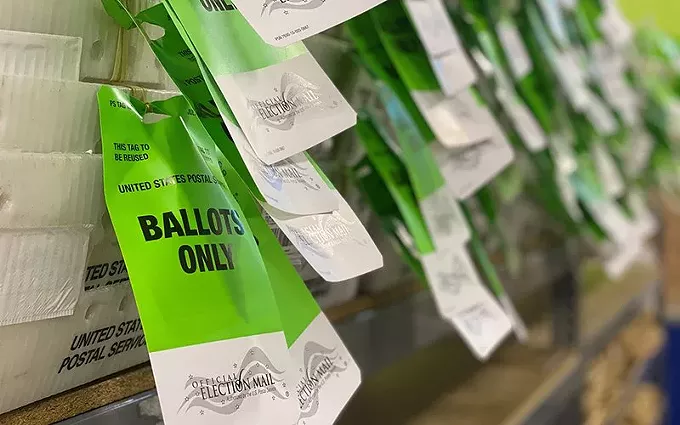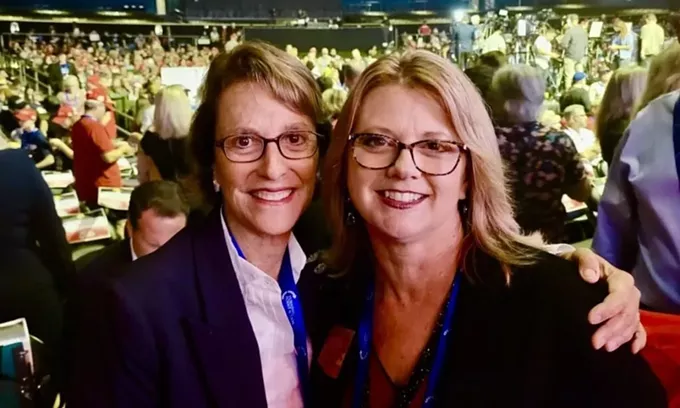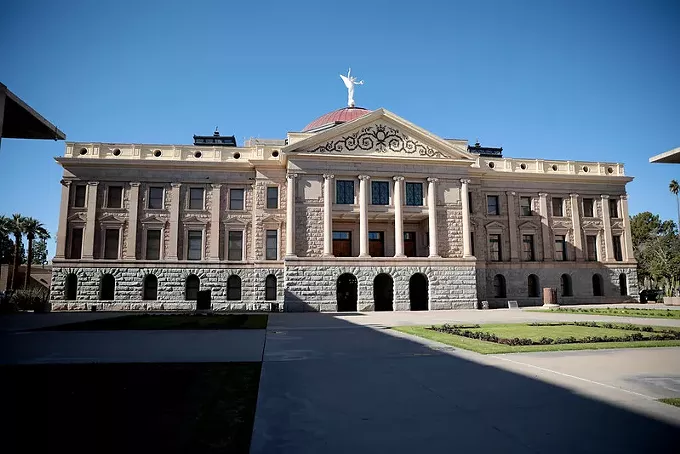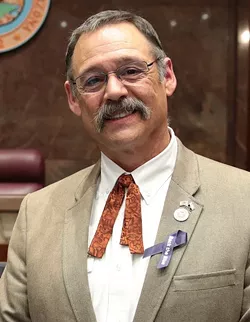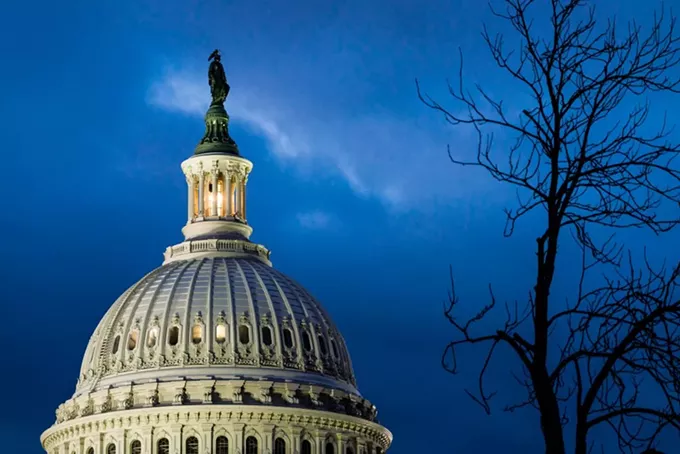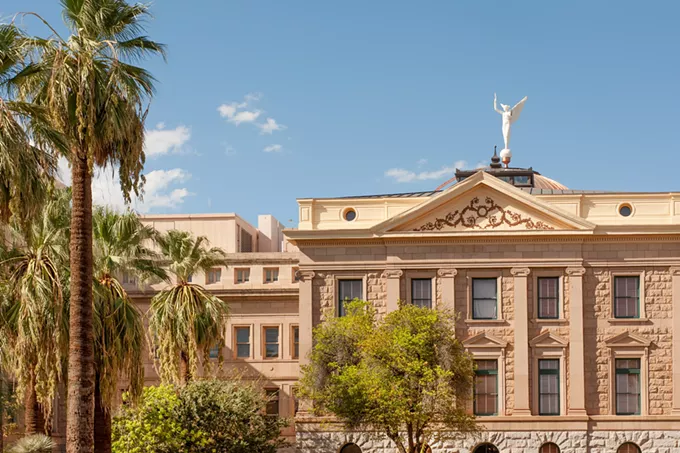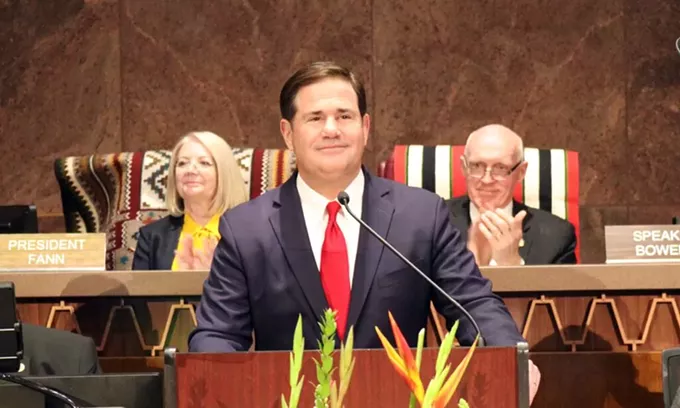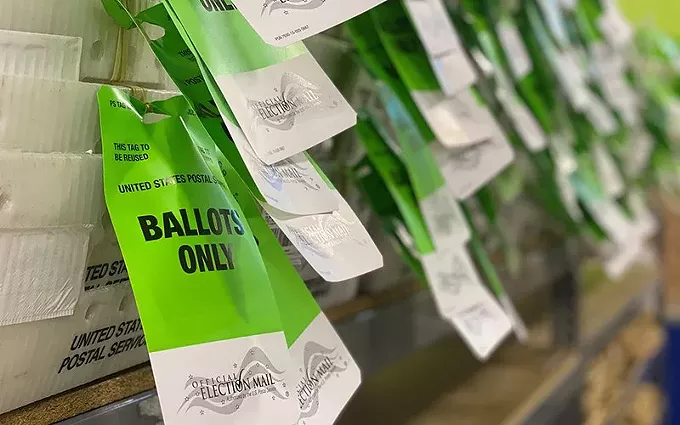Thursday, March 10, 2022
It's primetime for moderate Republicans ... It's better to be rich than to be not rich ... And it's a big day for license plates.
Editor's note: The Arizona Agenda is a Substack newsletter about Arizona government and politics run by Rachel Leingang and Hank Stephenson. You can find their archives and subscribe at arizonaagenda.com.
We noted recently that all the Big-Lie-inspired election legislation that has been flying through the Senate Government Committee is coming to a head before the full Senate — and after watching the Senate votes this week, now seems like a good time to revisit that.
The good news is Arizona voters can depend on Republican Sen. Paul Boyer to shoot down the worst of the worst bills that make it to the floor, no matter how many threats and hate emails he receives from angry election dead-enders. The bad news is even Republican Sen. Michelle Ugenti-Rita, who Democrats once dubbed the “queen of voter disenfranchisement,” is starting to sound reasonable and thoughtful in comparison to the rest of her caucus.
Take Ugenti-Rita’s explanation for joining Boyer and the Democrats in shooting down Senate Bill 1119, which would require counties to post images of all ballots cast online. She noted the bill would conflict with another bill still moving through the process that also deals with ballot images (both bills are from Sen. Sonny Borrelli, a superspreader of election disinformation) and argued haphazard lawmaking doesn’t result in good policy.
“I would prefer if we had a more specific idea of how we want to address issues before we just put all this stuff up on the board,” she said. “It’s havoc, it doesn’t yield good results, and I think last week demonstrated that this stuff has unintended consequences. The language of bills matters and means something.”
As we’ve written, we don’t even particularly think posting ballot images online is a bad idea — but having three different and conflicting bills to do it three different ways is emblematic of the Arizona Senate’s rush to do something, anything, all the things at once, to prove to the loudest election deniers that Republican senators take their conspiracies seriously.
Or at least most Republican senators do. But with the slim majorities Republicans hold in both chambers, any dissenter can stop a bill.
Wednesday, March 9, 2022
Senate Republicans on Monday advanced bills on voter registration that critics say will discourage some younger people — particularly college students — from registering to vote.
On Monday afternoon, the Senate Government Committee considered bills from the lower chamber. One bill would ban same-day voter registration — something that doesn’t exist in Arizona. Instead, residents must fill out a registration form 29 days before an election occurs to be eligible to cast their votes in that election. Only 20 states and the District of Columbia allow same-day registration.
The measure, House Bill 2237, is an attempt to preempt any future attempts to allow same-day registration. Of course, any future legislature that wished to enact same-day registration would simply be able to repeal the law banning it.
Government Committee Chairwoman Kelly Townsend said banning same-day registration was needed to reduce fraud, something she speculated was already happening with provisional ballots. The Apache Junction Republican is an ardent proponent of the Big Lie, the false belief that the 2020 election was stolen from Donald Trump by fraudulent voting. There is no evidence that Joe Biden won because of fraud, and a partisan review of the election in Maricopa County found no proof that the election results were inaccurate.
“If somebody were to vote who wasn’t registered and took a provisional ballot, are they able to circumvent the voter registration process?” she asked.
Provisional ballots are given to voters who show up at the wrong polling place, or whose eligibility to vote is unclear because they can’t provide the proper identification.
These ballots are kept separate from standard ballots until the end of the election, when determinations are made on whether or not to count it.
Townsend said she had been told this was an easy way for fraudulent voters to bypass safeguards, but Jen Marson, the executive director of the Arizona Association of Counties, said that is entirely unfounded. Townsend’s committee staff explained to the panel that voters without proper ID at the polls may be given a provisional ballot, but would need to verify their ID later at a county recorder’s office. If they can’t do so, the ballot is thrown out. An incomplete or nonexistent voter registration would also warrant a rejected provisional ballot.
The bill was passed by a narrow margin, 4-3 along party lines. Sen. J.D. Mesnard, R-Chandler, who had stepped outside the committee room, was ushered back into the room when the bill was up for a vote to ensure it passed. Shortly after the vote, he left again.
Also shepherded through the committee was House Bill 2243, which adds a statement to a voter registration form that notifies the registrant that, if they permanently move to another state, their registration will be canceled. It doesn’t specify what amount of time is considered permanent.
Under current law, voter registration addresses are verified by May 1 in preparation for an upcoming general or primary election. If a voter has moved within the county, their registration is updated and a letter is sent to the voter requesting address verification. If a county recorder receives a written notice of address change outside of the county, then that registration is canceled. A person must be a resident of Arizona for at least 29 days before an election to be eligible to vote in it, and residency, for registration purposes, is defined as someone with a physical presence in the state or someone who has an intent to return to the state if they are temporarily absent.
The bill’s sponsor, Rep. Jake Hoffman, R-Queen Creek, said the statement prevents lawsuits because voters must recognize and authorize the state’s right to remove them from the voter rolls if they move.
“What this does is adds a statement to the voter registration form that simply says, ‘I as a voter that am choosing to register, if I move permanently out of state — yes, you have the ability to follow the existing law and remove me from the rolls,’” he said.
Previously, House Minority Leader Reginald Bolding brought up concerns with the bill during a hearing in a House Government and Elections Committee on Jan. 26. He worried that it would affect college students attending out-of-state universities and seasonal workers. Rep. Lorenzo Sierra, D-Avondale, echoed Bolding at the same hearing, saying he was worried it would prevent his son from voting if he was accepted for a doctoral program out of state.
“I fear he goes and he’s accepted into some school somewhere out of Arizona, comes back in November to cast his vote somewhere and isn’t allowed to because he got kicked off the rolls. And because we don’t have same-day voter registration, (he) isn’t allowed to vote,” he said.
The bill hasn’t been amended since then, and was passed by the Senate Government Committee on Monday with a one-vote difference. Mesnard, with a phone tucked against his ear, was again summoned to the hearing room to vote, and he shouted his approval as he quickly cast his vote. Both bills move next to consideration by the full Senate, closer towards becoming law.
Arizona Mirror is part of States Newsroom, a network of news bureaus supported by grants and a coalition of donors as a 501c(3) public charity. Arizona Mirror maintains editorial independence. Contact Editor Jim Small for questions: info@azmirror.com. Follow Arizona Mirror on Facebook and Twitter.
It's the primary we all deserve ... What's grosser than restaurant health inspection reports? ... And some wise words from George.
Editor's note: The Arizona Agenda is a Substack newsletter about Arizona government and politics run by Rachel Leingang and Hank Stephenson. You can find their archives and subscribe at arizonaagenda.com.
Sometimes, what should be a sideshow becomes the main event. And we’re calling it now: The battle between Arizona Republican Sens. Kelly Townsend and Wendy Rogers will be the race to watch in the August primary.
We’re sure to see grab-your-popcorn antics in this race between two GOP women constantly in the news — the Phoenix New Times is already comparing it to a professional wrestling match — but the primary here says much more than just who can say the most bombastic soundbites.
To back up, Townsend and Rogers got drawn into the same district during redistricting. Well, Rogers actually was first drawn into a less-favorable district, but got looped into the more GOP-friendly Legislative District 7. Whoever wins the primary will very likely win the seat, given the partisan split of voters in the new district.
Rogers’ meltdown last week soured Townsend on her former ally, despite the many commonalities between the two right-wing politicians, neither of whom could be considered a moderate by any stretch. They both supported the election audit and decertification. They both want to see scores of changes to Arizona elections after Trump lost the state in 2020. They’re dim on COVID-19 vaccines and masks. They’re more alike than different.
Tuesday, March 8, 2022
Undoing an emergency change to the way elected political party activists are chosen is proving more difficult than passing the law in the first place.
Lawmakers last week approved legislation intended to standardize the number of signatures that congressional and legislative candidates need to get their names on the ballot. The process was thrown into disarray and confusion by a combination of changes to election laws in recent years, the redistricting process and delays in the 2020 Census. The legislation was introduced and unanimously approved in less than a day so it would be in place on Monday, when candidates can legally begin submitting their nomination petitions to qualify for the ballot.
The bill also included another provision, misunderstood or unread by many legislators, that makes drastic changes to the process for selecting party officials known as precinct committeemen.
The investigation by the Washington Post reviews previously unseen documentary footage by Danish filmmakers who had unprecedented access to the conservative political consultant, including on and after Jan. 6.
The Post obtained a copy of what was dubbed the “Stone Plan” to lobby for Trump to preemptively pardon a number of people, including himself, U.S. Reps. Andy Biggs and Paul Gosar of Arizona.
“Hell, Pardon not only Gaetz, Brooks, Biggs, Gosar, Jordan, Cruz and Hawley but every Republican remember (sic) of either House or Senate who voted for you,” Stone said in the memo obtained by the Post, referring to a variety of Trump political allies in Congress. “Pardon a movement. Give the Deep State the finger.”
Both Biggs and Gosar sought preemptive pardons for their roles in the Jan. 6 Capitol riots but neither received one. When reached by the Post, Gosar’s office said they were unaware of Stone’s effort and did not seek a pardon, stating he did nothing wrong.
Ali Alexander, one of the lead organizers of the “Stop the Steal” protest that culminated in the violent Jan. 6 riot at the U.S. Capitol said in a series of deleted videos that Biggs, Gosar, and Alabama Congressman Mo Brooks “schemed up” the plan to put “max pressure on Congress while they were voting” on whether to certify the results of the Electoral College.
In the footage reviewed by the Post, Stone met with Alexander at his home in Florida in late November and the two had deep connections, having been photographed at Republican events several times in prior years, the Post reported.
Alexander is connected to another Arizona politician as well, state Rep. Mark Finchem, a Republican from Oro Valley. After the events of Jan. 6, Alexander would say that the “Stop the Steal” movement had “taken over Arizona” due to Finchem.
Finchem was present at the Capitol on Jan. 6 and his story on where he was that day has not been consistent. Currently, he is fundraising to hire an attorney due to a subpoena from the congressional Jan. 6 Commission, saying he needs the attorney to fight off the “kangaroo court.”
In November, Finchem brought a number of Trump allies to Phoenix for an election integrity hearing that he would later say would help to convince Senate leadership to pursue the so-called “audit” of the election in Maricopa County.

WASHINGTON – Arizona Sen. Kelly Townsend, R-Mesa, dropped her bid for Congress Friday, after failing to get a “promised” endorsement from former President Donald Trump – and days after criticizing another Trump-backed candidate on the Senate floor.
Townsend on Wednesday joined other senators who had voted overwhelmingly a day earlier to censure state Sen. Wendy Rogers, R-Flagstaff, for Rogers’ appearance at a white nationalist conference where she praised the organizer.
“It was a hard decision because I knew I was throwing away a pathway to Congress, but it’s not worth it enough to me to have to stay quiet in order to get that endorsement,” Townsend said Friday.
She acknowledged that by “speaking up, I’m speaking out against someone that the president had endorsed.” She said Trump’s people never turned her down, but would not confirm an endorsement, and acknowledged that speaking out likely cost her the endorsement in the newly drawn 6th Congressional District, which stretches south from Casa Grande to include much of the southeastern part of the state.
But others noted that Townsend would have faced a tough race for Congress, regardless, with a late start in a new district that she does not currently live in, elements that would have “handicapped” her campaign even with a Trump endorsement.
“When she entered that congressional race, she was already well behind the eight ball,” said Doug Cole, the chief operating officer of HighGround Public Affairs Consultants.
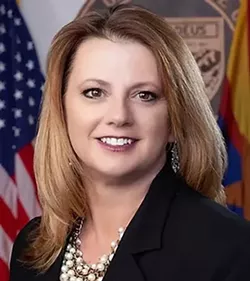
Townsend’s announcement comes just days after the Senate voted 24-3, with three senators not voting, to censure Rogers for “conduct unbecoming a senator” in her appearance at the America First Political Action Conference on Feb. 25.
At that conference, organized by white nationalists, Rogers praised those attending as “patriots.” She was also “encouraging violence against and punishment of American citizens and making threatening statements declaring, quote, political destruction, unquote, of those who disagree with her views,” said Sen. Rick Gray, R-Sun City, who proposed the censure resolution.
All 13 Democrats who were present and 11 of the 14 Republicans in the chamber voted for censure. A visibly shaken Rogers accused her colleagues of attacking her First Amendment rights, calling the censure resolution “nothing more than an attempt to limit my speech.”
“I do not apologize, I will not back down,” Rogers said Tuesday. “And I am sorely disappointed in the leadership of this body for colluding with the Democrats to attempt to destroy my reputation.”
Rogers did not respond to a request for comment Friday.
Townsend was among those not voting because she was not present Tuesday. But she took the floor Wednesday to say she would have voted yes, unless Rogers disavowed the “very ugly rhetoric” espoused by the conference organizer, including antisemitic remarks and comments about pedophilia.
“If the senator is willing to apologize for any misunderstanding and denounce this, my vote would have been red on the board in the name of free speech,” Townsend said. “If she is unable to do that, then I would want the record to show that had I voted, it would be green.”
In a prepared statement Friday, Townsend said she had been encouraged by “people close to President Trump” to enter the congressional race. When it became clear that she would not get the endorsement after her Wednesday floor speech, she said she decided to drop out for the good of the party.
Staying in the race, she said in her statement, “will serve only to split the conservative vote … and make it more difficult to elect an authentic America First candidate.”
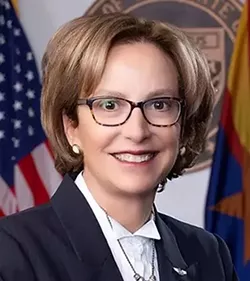
“I don’t want to be responsible for handing it to a moderate by splitting the vote without the Trump endorsement,” Townsend said in a phone interview Friday evening.
She said she has not made a decision about her political future, but analysts say one option would be for her to run for reelection, where she would face Rogers in a redrawn legislative district. In doing so, she would be taking on an extremely well-funded opponent in Rogers, who claims to have already raised more than $2.5 million.
“A key challenge for Townsend is the millions of dollars that Rogers has raised,” said Bill Scheel, a partner at the Arizona political consulting firm Javelina. “I think that is what Townsend would have to look at, is how she would compete.”
Experts said Rogers has already been able to use the censure vote to raise more money, but Scheel said the censure could still work in Townsend’s favor in a head-to-head matchup.
“I don’t think that a majority of Republicans, even in Arizona’s Legislative District 6, believe all of these crazy things that Wendy Rogers is saying,” Scheel said. “There are more mainstream Republicans who have come to support Townsend.”
Robert Robb, an editorial columnist for the Arizona Republic, agrees.
“If she were to run, I think she would have a chance to make the censure an issue in the primary,” Robb said. “She would be a formidable candidate.”
While she has not made any decisions, Townsend said Friday that she had received “overwhelming support” from voters for her Wednesday speech. Many of those she has spoken to have urged her to “run against her and deliver us from Wendy Rogers.”
“Right now I have to decide if I’m willing to work with people who are unwilling to do the right thing in the face of such hate,” Townsend said.
WASHINGTON — With just five days left before government funding expires, Democrats and Republicans are trying to reach agreement on $1.5 trillion in federal spending as well as billions more in assistance to Ukraine and COVID-19 relief.
U.S. Senate Majority Leader Chuck Schumer wrote Monday morning that Democrats made “a reasonable global offer to Republicans” and that he hoped both political parties would reach agreement before a stopgap government funding bill expires on Friday at midnight.
“We have been working on a bipartisan, bicameral basis through the weekend to finish work on an omnibus package that includes robust assistance to the people and government of Ukraine and additional funds to ensure our country is prepared if and when the next COVID variant strikes,” Schumer wrote.
The Biden administration last week requested Congress provide $10 billion in defense, economic and humanitarian aid to Ukraine amid the ongoing war there as well as $22.5 billion in coronavirus relief funding.
That threw a bit of wrench into ongoing negotiations to fund the government.
Democrats and Republicans have been working for months to hammer out a final agreement on the dozen annual government funding bills before a temporary spending measure expires on Friday.
Those talks were fragile enough without both parties trying to determine what is needed for the Ukrainian war effort as circumstances on the ground change by the hour.
The additional coronavirus relief funding also faces challenges.
Thirty-six Senate Republicans wrote a letter to President Joe Biden last week citing concerns about fraud and asking for “a full accounting” of how the U.S. government has spent the roughly $6 trillion on COVID-19 aid Congress has approved since March 2020.
The group specifically asked the White House to detail how much of the $350 billion in state and local aid Democrats provided in their $1.9 trillion COVID-19 package in March 2021 has been used for vaccines and testing.
According to the Committee for a Responsible Federal Budget’s tracker, about $244 billion of the $350 billion for state and local governments has been spent.
Local, state and tribal governments were able to use the funding for a variety of pandemic-related activities, including public health; premium pay for essential workers; to replace revenue lost due to the pandemic; and to invest in water, sewer, or broadband infrastructure.
The Senate GOP group didn’t rule out supporting billions more in coronavirus aid, but said “it must be an urgent priority that the trillions of taxpayer dollars already appropriated are being spent effectively.”
Speaker Nancy Pelosi wrote to her conference on Sunday to say that “Congress intends to enact this emergency funding this week.” She also said the House is working on separate legislation to address the ongoing Russian war in Ukraine.
The California Democrat said that bill would “further isolate Russia from the global economy” by banning imports of Russian oil and energy products, repealing normal trade relations with Russia, allowing the White House to increase tariffs on Russian imports and taking the first step to end Russian access to the World Trade Organization.
The White House, so far, has been reluctant to block imports of Russian oil over concerns it would increase gasoline prices even more than they’ve already gone up.
Pelosi wrote in her letter that “the United States need not choose between our democratic values and our economic interests.”
“The Administration and the Congress remain laser-focused on bringing down the higher energy costs for American families and our partners stemming from Putin’s invasion,” she continued.
The strong statements from Schumer and Pelosi followed a Zoom call that brought hundreds of U.S. lawmakers together with Ukrainian President Volodymyr Zelenskyy this weekend.
According to an individual on the call, Schumer told Zelenskyy that he, Senate Minority Leader Mitch McConnell and several other lawmakers were working in “a bipartisan fashion to get all the assistance the administration has requested for the Ukrainian people. Together we will get that assistance of over $10 billion in economic, humanitarian, and security assistance to the Ukrainian people quickly.”
Arizona Mirror is part of States Newsroom, a network of news bureaus supported by grants and a coalition of donors as a 501c(3) public charity. Arizona Mirror maintains editorial independence. Contact Editor Jim Small for questions: info@azmirror.com. Follow Arizona Mirror on Facebook and Twitter.
Reading first is easier than repealing later ... Daniel Patterson is back (in Nevada) ... And it's Election Day for some of you!

The Arizona Agenda is a Substack newsletter about Arizona government and politics run by Rachel Leingang and Hank Stephenson. You can find their archives and subscribe at arizonaagenda.com.
Arizona Republican lawmakers showed yesterday that they can move quickly to solve a problem if they really want to, while Democrats showed that they can adhere to the state Constitution if it’s politically beneficial to them. |
Yes, we’re talking about the precinct committeeman law debacle again.
The speed at which they moved to appease a few hundred political activists stands in stark contrast to the way they dealt with a real problem earlier this year, when schools were facing an effective cut of more than $1 billion and lawmakers waited until the 11th hour to act. If you’re also wondering what a PC is and why you should care, the shortest answer is they’re the lowest-ranking party officers, and they set the direction of their respective political parties. While the individual position holds little power, collectively, they help decide whether U.S. senators get censured or whether the party backs or opposes legislation at the Capitol.What's a PC?
— JoMo in the 480 (@JoMo480) March 7, 2022
After catching hell over the weekend from Republican PCs — many of whom chalked up a simple case of legislative incompetence to some far-fetched conspiracy — Republican lawmakers sprung into action to repeal the problematic provision of House Bill 2839 yesterday, with some pledging to grind the Legislature’s work to a halt until it’s fixed.
Monday, March 7, 2022
Gov. Doug Ducey’s claim that facilities in some Arizona counties are charging victims to process their rape kits is disputed by almost every county, and those advancing the claim refuse to reveal where it’s happening.
On Jan. 11, Ducey announced that some Arizona jurisdictions were charging victims $800 in processing fees in violation of the federal Violence Against Women Act, which guarantees that rape kits are free of cost for sexual assault victims.
Arizona law directs counties in which the assaults occur to cover the costs. The Arizona Mirror contacted all 15 county attorney’s offices in the state, and of the 14 that responded, all said they’d never heard of rape victims being charged fees in their counties. The county attorney for Apache County could not be reached after several requests for comment.
Brian McIntyre, the county attorney for Cochise County, said there was one incident 10 years ago — before he was in office — when a woman was billed for her rape kit at a local hospital emergency room. The matter was resolved by county officials after she notified them that her bill had been sent to collections.
“To my knowledge, that hasn’t happened since,” he said..
Mohave County Attorney Matt Smith said he once heard a rumor that hospitals were using collection agencies to go after victims for forensic exam fees. But in the past 10-15 years, that hasn’t been something he’s been aware of happening in Mohave.
Ducey’s claim appears to have originated with a September 2021 letter sent to the governor’s office from the Comission to Prevent Violence Against Women, which helps develop public policy. The $800 estimate was not included in the letter and interviews with the letter’s authors to find out which jurisdictions the governor was referring to were inconclusive.
After the governor made the allegation in his State of the State address, the Arizona Mirror contacted all 29 facilities in the state that provide forensic exams to rape victims. The 17 that responded to inquiries denied charging victims any fees.
The Arizona Republican Party is relying on “stray” language in the Arizona Constitution in what attorneys describe as a longshot challenge to overturn the state’s 31-year-old early voting law.
A lawsuit filed earlier this week by the AZGOP and one of its officials argues that a provision in the constitution stipulating that “electors may express at the polls” means that voting must be done in person, not by mail, as Arizona’s no-excuse early voting law allows for. The party’s attorney, Alexander Kolodin, is asking that the Arizona Supreme Court accept the case directly and declare the early voting law illegal. That would require most of the more than 80% of Arizona voters who use early voting to cast their ballots in person for the August primary and November general elections.
Two attorneys who spoke with the Arizona Mirror, however, said there are serious flaws in the AZGOP’s argument.
The provision that Kolodin cited isn’t actually in Article 7 of the Arizona Constitution, which covers suffrage and elections. Rather, it’s in Article 4, on the legislative department. Specifically, that language specifically pertains only to voting for citizen initiatives and referenda. No similar language exists in Article 7.
Josh Bendor, an attorney with the law firm Osborn Maledon who handles constitutional litigation, described that provision as “stray language” that provides little guidance. Bendor said that if the framers of the constitution who wrote that provision intended to provide specific instructions on how ballots should be cast, they would likely have done so in the section that dictates rules for elections.
Kolodin argued in his lawsuit that even though the language he cites only appears in the section on citizen initiatives and referenda, it’s not limited strictly to those contests because the constitution requires that such ballot measures be decided “at the next regular general election.” Alternatively, if the Supreme Court rejects the argument as a whole, Kolodin suggested that the justices limit voting on initiatives and referenda to in-person balloting, even if they don’t do so for voting on other contests.
Bendor noted that the provision says voters “may” express their approval or disapproval at the polls, not that they “shall” do so. That, he said, doesn’t mean that voters can’t decide on ballot measures in another way.
“They’re really sort of torturing the text there. And I think the court will see through it,” Bendor said.


